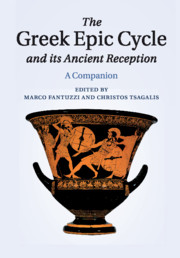Book contents
- Frontmatter
- Contents
- List of illustrations
- List of contributors
- Editorial note
- Introduction: Kyklos, the Epic Cycle and Cyclic poetry
- PART I APPROACHES TO THE EPIC CYCLE
- PART II EPICS
- 11 Theogony and Titanomachy
- 12 Oedipodea
- 13 Thebaid
- 14 Epigonoi
- 15 Alcmeonis
- 16 Cypria
- 17 Aethiopis
- 18 Ilias parva
- 19 Iliou persis
- 20 Nostoi
- 21 Telegony
- PART III THE FORTUNE OF THE EPIC CYCLE IN THE ANCIENT WORLD
- Works cited
- Index of principal passages
- Index nominum et rerum
12 - Oedipodea
from PART II - EPICS
Published online by Cambridge University Press: 05 August 2015
- Frontmatter
- Contents
- List of illustrations
- List of contributors
- Editorial note
- Introduction: Kyklos, the Epic Cycle and Cyclic poetry
- PART I APPROACHES TO THE EPIC CYCLE
- PART II EPICS
- 11 Theogony and Titanomachy
- 12 Oedipodea
- 13 Thebaid
- 14 Epigonoi
- 15 Alcmeonis
- 16 Cypria
- 17 Aethiopis
- 18 Ilias parva
- 19 Iliou persis
- 20 Nostoi
- 21 Telegony
- PART III THE FORTUNE OF THE EPIC CYCLE IN THE ANCIENT WORLD
- Works cited
- Index of principal passages
- Index nominum et rerum
Summary
Being placed after a Theogony and/or a Titanomachy which dealt with cosmic forces and battles between divinities, the Oedipodea was the first poem of the epic cycle to deal with stories of heroes. In this respect, it can safely be taken as the opening poem not just of the Theban cycle, but of the entire thematic and chronological sequel which covered four generations of heroes (five, if one includes Laius), starting with Oedipus in the Theban epics, and ending with Telemachus and Telegonus, the sons of one of the main heroes in the Trojan epics, Odysseus. Three generations of heroes out of four were covered by the Theban cycle, in spite of the smaller number of poems involved in the narrative, whereas the Trojan cycle covered only two generations: in fact, the third generation was shared by both traditions, since some of the heroes who conquered Thebes in the expedition of the Epigonoi set off to Troy a few years later. In the construction of the epic cycle the wars at Thebes and at Troy took place in the span of a few years; they were welded into one sequential string of events, according to the akolouthia tōn pragmatōn (Phot. Bibl. 319a 30); the manufacture was effected probably by the Alexandrian grammarians but may have started even earlier, in pre-Hellenistic times, in the milieu of the school of Aristotle at Athens, although no piece of evidence remains to corroborate this possibility.
In spite of the great popularity enjoyed from the archaic age throughout antiquity by the myths of Oedipus and of the Seven against Thebes and the Epigonoi, the precise sequence of events and the handling of characters and episodes in the Theban epics are difficult to reconstruct. The fragments of the Oedipodea and of the Epigonoi in particular are very scanty to say the least: altogether they amount to less than ten with only three verbatim fragments totalling four lines. Besides, differently from the poems of the Trojan cycle, no prose summary has survived from the second-century AD grammarian (or fifth-century AD Neoplatonist) named Proclus – who was drawing on an older source – recalling the main episodes in each poem.
- Type
- Chapter
- Information
- The Greek Epic Cycle and its Ancient ReceptionA Companion, pp. 213 - 225Publisher: Cambridge University PressPrint publication year: 2015
- 3
- Cited by



